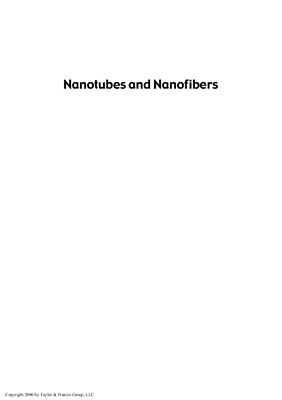CRC Press, Taylor & Francis Group, 2006, Pages: 244
The discovery and rapid evolution of carbon nanotubes have led to a vastly improved understanding of nanotechnology, as well as dozens of possible applications for nanomaterials of different shapes and sizes ranging from composites to biology, medicine, energy, transportation, and electronic devices. Nanotubes and Nanofibers offers an overview of structure–property relationships, synthesis and purification, and potential applications of carbon nanotubes and fibers, including whiskers, cones, nanobelts, and nanowires.
Using research on carbon nanotubes as a foundation to further developments, this book discusses methods for growing and synthesizing amorphous and nanocrystalline graphitic carbon structures and inorganic nanomaterials, including wet chemical synthesis, chemical vapor deposition (CVD), arc discharge, and others. It also describes boron nitride and metal chalcogenide nanotubes in detail and reviews the unique properties and methods for characterizing and producing single-crystalline semiconducting and functional-oxide nanowires. The chapters also identify challenges involving the controlled growth, processing, and assembly of organic and inorganic nanostructures that must be addressed before large-scale applications can be implemented.
Edited by award-winning professor and researcher Dr. Yury Gogotsi, Nanotubes and Nanofibers offers a well-rounded perspective on the advances leading to improved nanomaterial properties for a range of new devices and applications including electronic devices, structural composites, hydrogen and gas storage, electrodes in electrochemical energy-storage systems, sorbents, and filters.
The discovery and rapid evolution of carbon nanotubes have led to a vastly improved understanding of nanotechnology, as well as dozens of possible applications for nanomaterials of different shapes and sizes ranging from composites to biology, medicine, energy, transportation, and electronic devices. Nanotubes and Nanofibers offers an overview of structure–property relationships, synthesis and purification, and potential applications of carbon nanotubes and fibers, including whiskers, cones, nanobelts, and nanowires.
Using research on carbon nanotubes as a foundation to further developments, this book discusses methods for growing and synthesizing amorphous and nanocrystalline graphitic carbon structures and inorganic nanomaterials, including wet chemical synthesis, chemical vapor deposition (CVD), arc discharge, and others. It also describes boron nitride and metal chalcogenide nanotubes in detail and reviews the unique properties and methods for characterizing and producing single-crystalline semiconducting and functional-oxide nanowires. The chapters also identify challenges involving the controlled growth, processing, and assembly of organic and inorganic nanostructures that must be addressed before large-scale applications can be implemented.
Edited by award-winning professor and researcher Dr. Yury Gogotsi, Nanotubes and Nanofibers offers a well-rounded perspective on the advances leading to improved nanomaterial properties for a range of new devices and applications including electronic devices, structural composites, hydrogen and gas storage, electrodes in electrochemical energy-storage systems, sorbents, and filters.

